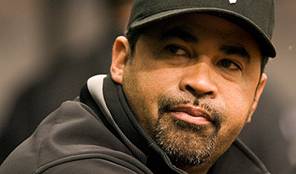Visits: 0
 Volume III, Issue 11: A Publication For Your Reading Enjoyment
Volume III, Issue 11: A Publication For Your Reading Enjoyment
Do this simple experiment. Copy a couple of paragraphs from this newsletter and paste into any online translation website (I use Yahoo! Babel Fish) and translate into Spanish. Now take the Spanish translation and translate back into English. Not quite what was originally written, is it? The experiment points out the intrinsic value of people who can accurately translate languages.
With that in mind, I definitely understand many of the comments made recently by White Sox Manager Ozzie Guillen who stated Asian players are provided services that Latino players do not receive. He said Japanese players are given translators when they come to the United States while Latinos do not get the same assistance.
Guillen, who is from Venezuela, said, “Why do we have Japanese interpreters and we don’t have a Spanish one? Why do they have that privilege and we don’t?” He described going to see his son, Oney, who is playing minor league baseball and says the team has a translator for a Korean prospect who he claims makes more money than the players.
“Don’t take this wrong, but they take advantage of us,”Guillen said. “We bring a Japanese player and they are very good and they bring all these privileges to them. We bring a Dominican kid — Go to the minor leagues, good luck. Good luck. And it’s always going to be like that. It’s never going to change. But that’s the way it is.”
Given how things can get lost in translation, Guillen’s argument makes sense; why don’t teams routinely provide translators for Latino players whose primary language, like Asian players, is not English?
A few years ago, a number of Latino sports writers and broadcasters had a beef with the New York Yankees who refused to allow members of the Spanish language media to ask questions in Spanish to the newly acquired Alex Rodríguez. The Yankees insisted that questions in Spanish be held to the end of the press conference, but anyone who has ever been in a press conference knows that by the end the quotes are old and stale, and players tend to give yes and no responses, which puts the Latino media at a disadvantage.
Julio Pabón, a good friend of mine, said he spoke out about the situation many years ago when he went to spring training and was often asked to act as translator for non Spanish speaking reporters who wanted to question Latino players, noting even then that Asian players had their own interpreters. That, and the situation with the Yankees, led to the creation of the Latino Sports Writers and Broadcasters Association (LSWBA). The LSWBA met with both the Yankees and the Mets and, as a result, both teams now hold monthly press conferences in Spanish, but do not provide translators in the dugout or at post game interviews.
Pabón, who is president of the association, insists that the absence of Spanish language interpreters is because teams “do not understand Latino players, or the Latino community; they are taken for granted and the end result is a lack of respect for both. Teams have a ready-made source of players in the Dominican Republic, in Venezuela, and Latin American, so they do not feel they have to do anything special because of the abundance of players.
“Japan, China, the Orient are new markets with billions of people. It is not about the players, but the expansion of the market into the global economy so they will do anything for these players. It is all about the money, and Latinos are considered cheap and because it is economically cheap, that is the way they treat us. There are no supportive services.”
He added that what is provided Asian players goes beyond translators, that they are assigned what amounts to personal assistants who “help them transition into a new culture, into a new society, helping to acclimate them. They are babysitting them in their transition as players and you do not see that with Latino players. The Japanese player, he is totally foreign to the environment. They are assuming that the Latino player is not, that he will be okay, and that is not fair.”
Guillen also criticized Major League Baseball over what he says is the lack of steroid education provided Latino players, saying, “I’m the only one to teach the Latinos about [what] not to use. I’m the only one and Major League Baseball doesn’t care.”
MLB released a statement refuting the charge. “We spend more time and effort educating our Latin players about PED (performance enhancing drug) use than we do our domestic players in the United States,” said spokesman Rich Levin. Baseball has instituted a drug education program for all teams in the Dominican Republic.






You must be logged in to post a comment Login